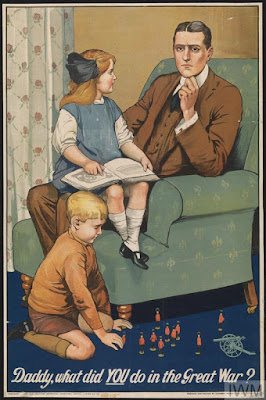 |
| Banner poster for the current run of Tom Stoppard's Travesties |
The reader of a play whose principal characters include Lenin, James Joyce and Tristan Tzara may not realize that the figure of Henry Carr is likewise taken from history. But this is so.
This is how Tom Stoppard introduces the text of his play, Travesties, which was first performed in London in 1974. The play came to the attention of Durham at War when a member of the public, who preferred to remain anonymous, submitted an update to the site pointing out that the lead character was one of the Canadian soldiers we have on our website.
A historical training instils a healthy scepticism and, to be honest, I thought that Tom Stoppard writing a play about a man from Sunderland seemed unlikely. I thought that the man on our website might have had the same name but it couldn’t actually be based on him, could it? A little digging on the internet proved me wrong.
Henry Wilfred Carr, born in Houghton-le-Spring, was the “hero” of Stoppard’s play which has been staged twice by the Royal Shakespeare Company, and is currently running in the West End, (at the time of writing, Tom Hollander, who plays Carr, is awaiting to find out whether he will win an Olivier award for his portrayal). In the introduction to Travesties, Stoppard explains that he used some of the actual events of Carr’s life as a basis for the play and that after it first ran, Carr’s wife contacted him and filled in some of the rest of Henry’s story.
 |
| Poster producing to encourage recruitment,Imperial War Museum, Non-commercial Licence, © IWM (Art.IWM PST 0311) |
It seems that Henry was in Switzerland during the First World War because he was injured during the Second Battle of Ypres whilst serving with the 13th Battalion of Royal Highland Regiment of Canada, he was then taken as a prisoner of war. Firstly he was interned in Germany and then transferred to Switzerland for treatment (see also Angus Leybourne and Very British Romance). While there, he worked in a minor role for the British Consul who was approached by James Joyce’s theatre company to try and find actors to fill the cast of a production of Oscar Wilde’s “The Importance of Being Earnest”. Apparently Carr was tall, handsome, and had a little experience of acting and so was cast as Algernon.
The story goes that Carr threw himself into the part, to the extent that he bought trousers especially for the role, and was something of a popular success, but that he didn’t get on with Joyce. At the end of the run, Carr felt that his expenses were handed to him in a rather high-handed manner, complaining that it felt like Joyce had been doling out a tip. The pair fell out so much that the matter ended up in court; Carr claimed financial recompense for the trousers, and Joyce alleged that Carr had sold tickets and pocketed the proceeds. Ultimately, Joyce got his revenge by creating a bit-part character named Carr in his masterwork Ulysses. Joyce’s Carr is a drunken foul-mouthed private soldier who attacks Stephen Dedalus, who is often interpreted as being Joyce’s literary alter-ego.
So, Stoppard’s play was the second work of art to immortalise Henry Wilfred Carr. In Travesties, Henry Carr is an old man reminiscing about the staging of Wilde’s play. As well as James Joyce, Stoppard throws in the “characters” of Lenin and Tristan Tzara, a Dadaist poet. Although all three historical personages were in Zurich during the First World War, they were not present in the city at the same time. The bending of historical reality is something of a theme of the play; as the action unfolds it becomes obvious that Carr’s memory is unreliable.
You can read more about Henry Wilfred Carr here on Durham at War: http://www.durhamatwar.org.uk/story/11584/

No comments:
Post a Comment